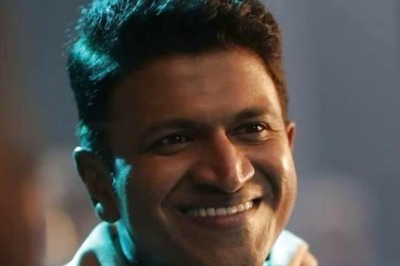Shivaji Maharaj Jayanti: Tales of Valiant Ruler Amid 1st Agra Fort Celebration, 'Amol Kohle Boycott'

views
It’s the 393rd birth anniversary of Chhatrapati Shivaji Maharaj today. The Maratha leader, apart from inspiring Indians with his place in history, has also held political relevance even in current times. The event is making headlines – from it being celebrated for the first time at the ‘Diwan-e-aam’ of the Agra Fort, to NCP leader Dr Amol Kohle ‘boycotting it.’
Let’s take a look at the life of Shivaji, and what’s happening now:
Chhatrapati Shivaji Maharaj, also known as Shivaji Bhonsale I, was the Maratha Empire’s founder and first king. While the exact date of his birth is debated, the State Government of Maharashtra recognises February 19, 1630, as his official date of birth, said a report by CNBC-TV18.
Chhatrapati Shivaji Maharaj Jayanti was first observed by Indian nationalists in Maharashtra in the nineteenth century. Today, the day is observed to commemorate Shivaji’s accomplishments as a great king and military general. In Maharashtra, the anniversary is a public holiday.
A Look at History
Shivaji was the son of Shahaji Bhonsale, a Deccani Sultans’ general, and Jijabai, a Devagiri Yadav. Contrary to common belief, Shivaji was named after a famous local deity rather than Lord Shiva, the report by CNBC-TV18 says. At the age of 16, Shivaji launched his conquest campaign against the neighbouring Bijapur Sultanate, which was beleaguered by internal strife at the time.

Shivaji’s campaign began with a victory over a 20,000-strong Bijapuri army led by General Afzal Khan. His victory over the Mughal Empire’s vassal, the Bijapur Sultanate, caught the attention of Aurangzeb, the Mughal Viceroy of the Deccan. Shivaji fought intermittently with the Mughal Empire for the rest of his life, and he was formally coronated as the Chhatrapati from his fort of Raigad in 1674.
When Did His Anniversary Start Getting Celebrated?
Shivaji was a military prodigy as well as a kind ruler. With his fights against the Mughal Empire, which was the dominating power in the Indian subcontinent at the time, Shivaji laid the groundwork for the Maratha Empire. His empire grew to become the largest powerhouse in the Indian subcontinent, reaching from Tamil Nadu to Peshawar and from Goa to the Hooghly River at its zenith, just over a century after his conquests began.
Religious tolerance and the blending of diverse Hindu castes were important aspects of Shivaji’s kingdom. Only the Second and Third Anglo-Maratha Wars resulted in the British East India Company taking over the Indian subcontinent and the empire’s disintegration, the report says.

The birth anniversary of Shivaji was first commemorated in 1870, thanks to the efforts of Maharashtrian social leader and activist Mahatma Jyotirao Phule. Bal Gangadhar Tilak, an Indian revolutionary and reformer, continued on this tradition.
Shivneri Fort
Chief Minister Eknath Shinde, Deputy CM Devendra Fadnavis, ministers and other dignitaries, including possibly Union Home Minister Amit Shah, are expected to attend the special Shivaji Jayanti function on Sunday at the Shivneri Fort.

Ranked as an ‘invincible’ hillfort, the triangular-shaped Shivneri Fort has a temple dedicated to Goddess Shivai Devi, after whom the infant Shivaji was named, and is the place where he spent several years of his childhood.
The fort is spread over 1.6 sq. km, has seven strong gates, mudwalls surround the structure, along with a prayer hall, a tomb, a mosque, an execution area, a freshwater pond fed by two springs which flow throughout the year.
In 2021, the imposing Shivneri Fort was included in the tentative list of the Unesco World Heritage Sites.
In a First, Agra Fort Celebration
For the first time the 393rd birth anniversary of Chhatrapati Shivaji Maharaj shall be celebrated at the ‘Diwan-E-Aam’ of the Agra Fort. The development came after years of efforts by the Maharashtra government and several social organisations after which the Uttar Pradesh Government has permitted the Shiv Jayanti celebrations in the Agra Fort.
Many social groups had urged the government to celebrate the event in a grand manner at the ‘Diwan-E-Aam’ in the Agra Fort but the appeal was rejected by the Archaeological Survey of India (ASI), which looks after the heritage monument. Later, they moved the Delhi High Court, which directed the ASI to allow the celebrations if the Maharashtra Government is involved as a co-organiser.
Accordingly, Chief Minister Eknath Shinde, Deputy Chief Minister Devendra Fadnavis wrote to the ASI and other authorities that the state government will associate with the event along with some social groups. In September 2020, UP Chief Minister Yogi Adityanath had decided to rename the existing Mughal Museum in the fort as ‘Chhatrapati Shivaji Maharaj Museum’.
Agra Fort History
Agra Fort has a special significance in the history of the Mughal and the Maratha empires which were at loggerheads for long. It was in the summer of 1666 that the Maratha King Shivaji was invited by the Mughal Emperor Aurangzeb to attend his 50th birthday celebrations at the royal court in Agra.

Shivaji, along with his son Prince Sambhaji, reached Agra for the birthday on May 12, 1666, and in an act of deceit, the duo was held captive by Emperor Aurangzeb’s troops. Along with his band of loyal soldiers, Shivaji and Sambhaji remained captive for around three months before making their daring escape in boxes of sweets on August 17, 1666.
That famous getaway became the stuff of legends and folklore that remains fresh even today while the valorous Maratha leader was crowned as Chhatrapati Shivaji Maharaj in 1674, in Raigad.
Why is Amol Kohle Boycotting the Event?
Actor and Nationalist Congress Party MP Dr. Amol Kolhe on Thursday announced that he will boycott the Maharashtra government’s official function marking the 393rd birth anniversary of Chhatrapati Shivaji Maharaj to be held at Shivneri Fort in Pune, on February 19.
“For many years, despite its historic significance, there has been no permanent saffron flag installed at Shivneri Fort. I have been making repeated requests and even raised the issue in the Parliament but nothing has moved,” said Kolhe, who represents Shirur constituency in the Lok Sabha.
Noted for portraying the role of Chhatrapati Shivaji Maharaj and Chhatrapati Sambhani in several tele-serials and films, Kolhe hails from Junnar in Pune and the Shivneri Fort falls in his Parliamentary constituency.
The government’s function is scheduled at the historic Shivneri Fort in Pune district, which is the birthplace of Shivaji who was born there on February 19, 1630. However, Kolhe said that he would visit the Shivneri Fort that morning independently to celebrate the day and offer tributes at the memorial of the Maratha warrior king in the fort, comprising the statues of Rajmata Jijabai and a young Bal Shivaji.
With inputs from IANS
Read all the Latest Explainers here


















Comments
0 comment